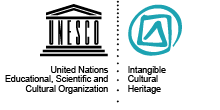Peking opera
Inscribed in 2010 (5.COM) on the Representative List of the Intangible Cultural Heritage of Humanity
Country(ies): China
Identification
Description

- Peking opera
- © 2009 by Liu Yuanxia/ Beijing Bureau of Culture
Peking opera is a performance art incorporating singing, reciting, acting, martial arts. Although widely practised throughout China, its performance centres on Beijing, Tianjin and Shanghai. Peking opera is sung and recited using primarily Beijing dialect, and its librettos are composed according to a strict set of rules that prize form and rhyme. They tell stories of history, politics, society and daily life and aspire to inform as they entertain. The music of Peking opera plays a key role in setting the pace of the show, creating a particular atmosphere, shaping the characters, and guiding the progress of the stories. ‘Civilian plays’ emphasize string and wind instruments such as the thin, high-pitched jinghu and the flute dizi, while ‘military plays’ feature percussion instruments like the bangu or daluo. Performance is characterized by a formulaic and symbolic style with actors and actresses following established choreography for movements of hands, eyes, torsos, and feet. Traditionally, stage settings and props are kept to a minimum. Costumes are flamboyant and the exaggerated facial make-up uses concise symbols, colours and patterns to portray characters’ personalities and social identities. Peking opera is transmitted largely through master-student training with trainees learning basic skills through oral instruction, observation and imitation. It is regarded as an expression of the aesthetic ideal of opera in traditional Chinese society and remains a widely recognized element of the country’s cultural heritage.
Documents
- Nomination form: English|French
- Consent of communities: Chinese/English
Decision 5.COM 6.7
The Committee (…) decides that [this element] satisfies the criteria for inscription on the Representative List of the Intangible Cultural Heritage of Humanity, as follows:
- R.1: Peking opera is a representative cultural expression of China, transmitted from generation to generation and recognized by the community concerned as part of its heritage;
- R.2: Its inscription on the Representative List could contribute to ensuring the visibility of the intangible cultural heritage not only in China, but also worldwide, while promoting dialogue and cultural exchange;
- R.3: Safeguarding measures for transmission, diffusion and academic research are elaborated, combining the efforts of both the State and the community;
- R.4: Opera troupes and practitioners welcomed the nomination, which includes evidence of their free, prior and informed consent;
- R.5: Peking opera is inscribed on the National List of Intangible Cultural Heritage administered by the Department of Intangible Cultural Heritage of the Ministry of Culture.
Slideshow
Video
© 2009 by Han wen / Beijing Bureau of Culture
These videos (and many more) can also be consulted through the UNESCO Archives Multimedia website











